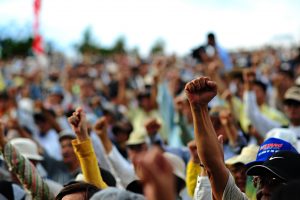Yasmina Mrabet will be attending Friday’s presidential inauguration — along with almost 25,000 peers. Mrabet is an organizer for the ANSWER Coalition, a protest and civil rights organization that counts itself among more than two dozen groups to have applied for First Amendment permits to demonstrate at the presidential inauguration.
The coalition currently holds permits along the parade route for a large stage at Navy Memorial Plaza and a smaller stage at Freedom Plaza. The group also plans to demonstrate on 14th Street near Pennsylvania Avenue, with 23,000 participants and counting expected.
“All progressive social change has been a consequence of mobilization that has taken place at the grassroots,” Mrabet said. “Protests and demonstrations are a part of every grassroots movement. … Change doesn’t happen suddenly. It happens as a process.”
The coalition’s plan for Inauguration Day includes hosting speakers, performers and activists to discuss why they believe soon to be installed Donald Trump’s agenda should be fought against. Among coalition concerns are the lifting of environmental regulations, the expansion of military spending and promises of mass deportations. The purpose of taking to the parade route is motivated by a desire to be seen by the media and to show onlookers across the country and around the world that there is dissent to Trump’s presidency.
Mrabet said that the ANSWER Coalition was planning on demonstrating on Inauguration Day even if former Secretary of State Hillary Clinton was elected. The plan for Friday is to protest while announcing future efforts. Those planning on participating, many of them arriving via buses organized by the coalition from New York City, Chicago, Boston, New Haven, Conn. and Florida, are being encouraged to arrive between 6 a.m. and 7 a.m., Mrabet said.
“Get there as early as possible and don’t bring large bags. We recommend no bags,” she said. “There are size regulations on signs. People should show up early. Dress warm. Stuff some sandwiches in their pockets and be ready to be out there all day.”
Groups representing a variety of interests preparing in earnest to demonstrate during Inauguration Day has meant a hectic past few months for the National Park Service (NPS), which works to organize the proceedings. As of Friday, NPS had accepted 28 First Amendment applications, though a few have since been withdrawn, and issued 11 permits. Most, if not all, applying groups are anticipated to receive permits on a first-come-first-serve basis, according to spokesperson Mike Litterst.
“It doesn’t change our approach since so much of how the permits are assigned and administered, that’s all codified,” Litterst said, adding that the typical number of First Amendment demonstrations for an inauguration ranges between four and six. “Having a five-fold increase with the same number of staff to process them has caused a ripple.”
Permits are not required for groups smaller than 25 people and there is no deadline for applications, Litterst said. The hope is that groups interested in demonstrating apply so that they may have space to do so. NPS staff have been juggling – trying to accommodate applicants with sufficient spaces. Applicants are asked for an estimated headcount to ensure that spaces provided are sufficient.
The current docket is filled predominantly with religious organizations and organizations protesting against the president elect, with a handful of pro-Trump organizers. Among them are Let America Hear Us, Roar for Trump! – organized by Ski Bischof. Though independent of Bikers for Trump – which has also applied for a permit – Bischof’s group plans to ride to Washington, D.C.’s Dupont Circle from Vienna, Va. with 500 to 600 cyclists, throttling up engines upon arrival.
“We’re coming down to show our faith in our president elect,” he said. “We are one of the few groups down there that are pro-Trump, unfortunately.”
Bischof said that he sees the group’s presence on Inauguration Day as both a celebration and exercising of First Amendment rights. Bischof said that he was a Democrat for 34 years and would shrug and accept it when a Republican was elected into the White House. He said that he attended three Trump rallies during the campaign and was turned off by the flood of #NotMyPresident hashtags he saw on social media the day following the election.
Social media is how Bischof’s original idea for a small celebration on Inauguration Day took off. Bischof said that he and many of his groupmates are hardworking members of the middle class ranging from construction workers to small-business owners to veterans. He assumed that he and maybe 40 or 50 of his fellow bikers from the Allentown, Pa. area would participate. In recent weeks, however, groups from Reading, Pa., Richmond, Va., and elsewhere have signed on.
Bischof said that he and his peers are not right-wing or party affiliated, adding that he doesn’t see Trump as a Republican and that many of Trump’s supporters are ex-Democrats and “average Joes.” He noted that much of Trump’s support has come in the form of grassroots efforts and social media and, moving forward, it will be up to such groups to stay informed and in the ear of elected officials.
“Do research,” Bischof said. “If there is a good law, write to your congressman and senators and support it. If it’s a bad law, don’t play the party line. Everybody has something to say, but only one third of America votes.”
Douglas Rutzen, president and CEO of the International Center for Not-for-Profit Law (ICNL), will be keeping a close eye on the events in Washington, D.C., and across the country. Freedom of assembly is one of ICNL’s primary focuses and so attentions will be set on not only the permit process ahead of the inauguration, but how protests and demonstrations are held and met nationwide in the coming days and weeks.
Rutzen described the current political climate as a unique time and noted that there is plenty of passion and polarization around issues. One outlet for this raw emotion is protesting – not only for current concerns, but to lay down the foundation for the expression of discontent in the months and years that follow, he said. “We’ve always worked in the U.S.,” he said. “We are anticipating that there will be a greater need for our work in the U.S.”
Leaders at ICNL are concerned about legislative initiatives that might affect civil society. They are unsure where it might come from, however, possibilities including securitization, militarization and tax reform. More local initiatives include the random audits and harassment reported by some local-level refuge groups and state legislation such as an Iowa representative’s “suck-it-up-buttercup” proposal that would reduce funding to state universities providing election-related sit-ins and counseling beyond what is normally available.
Rutzen said that civil society and nonprofits are likely to respond with a variety of events around the inauguration. “Civil society is quite creative and they are thinking,” Rutzen said.
The Women’s March on Washington, slated for the day after the inauguration, is the most prominent example. An estimated 200,000 participants are expected rally near the U.S. Capitol at Independence Avenue and Third Street SW with a host of performers, advocates and entertainers. The rally will be followed by a march, the route for which has yet to be determined. A litany of organizations have partnered on the project, including the American Civil Liberties Union (ACLU), National Association for the Advancement of Colored People (NAACP), GLAAD and Planned Parenthood.
Two other examples of events taking place around Inauguration Day are Public Citizen’s teach in and a Peace Ball led by Code Pink, Democracy Now! and Busboys and Poets, a community gathering space.
Public Citizen’s teach in, to take place on Jan. 21 following the Women’s March on Washington, was originally planned to coincide with the seventh anniversary of the U.S. Supreme Court’s 2010 Citizens United v. Federal Election Commission decision. After Trump was elected, however, plans were expanded to include a variety of workshops involving opportunities to organize on immigration-rights, women’s rights, civil rights and environmental issues, according to Jonah Minkoff-Zern, co-director of the Democracy Is For People Campaign.
At least 1,000 people are expected to participate in the teach-in, to be held at All Soul’s Church in Washington, D.C., and surrounding locales. Speakers are expected to include Lily Eskelsen García, president of the National Education Association; Ilyse Hoge, president of the National Abortion and Reproductive Rights Action League; Tara Houska, national campaign director for Honor the Earth; and Rep. Jamie Raskin (D- Md.). Participants may register at www.j21teachin.org.
Across town, Code Pink will be partnering with a variety of organizations in protest efforts, according to co-founder Medea Benjamin. Efforts will include participation in the Women’s March on Washington and the Peace Ball, which is expected to host 3,000 guests. It will be the third Peace Ball for Code Pink, according to Benjamin. The first was to celebrate Obama’s inauguration, the second was to evaluate the tasks at hand four years ago. This iteration will have the goal of allowing people to network and remain active and tuned-in, she said.
Benjamin described Code Pink as being in wait-and-see mode, with concerns centered around potential harms to the immigrant and Muslim communities along with steps back on the environment and healthcare. Benjamin anticipates Code Pink partnering with a wide variety of organizations in the comings weeks and months, just as it has recently. For large efforts, such as the Women’s March on Washington, the plan is to work alongside major groups such as Planned Parenthood and the National Organization for Women. There is also an appetite to take more radical efforts with organizers involved and interested in civil disobedience.
“We’re very anxious to be a part of the broad movement that is resisting Trump and the policies that he stands for and so we’ve been protesting at the hearings and we will be in the streets during the inauguration and the inaugural activities during those three days as well as participating in the Women’s March,” Benjamin said. “We think it will be a strong showing of opposition from a broad range of Americans.”










